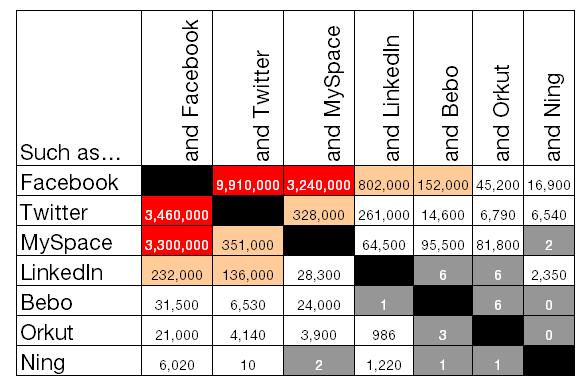I’m getting very annoyed with the phrase “such as…” in journalism. It’s becoming a lazy substitute for not having concrete facts, and is used especially to write about websites and social networks where the writer usually has no idea what they are talking about.
In other words, the phrase “such as Facebook and Twitter” really means “something’s going on online and it must be going on on Facebook and Twitter so just say that as that’s the only new thingy we’ve heard of in the newsroom”.
Some examples:
From the Telegraph: “Teachers believe social networking sites such as Facebook and Twitter are to blame for pupils’ poor grades, a study has concluded.”
From the FT (see, I’m not biased): “Banks are searching out fresh ways to engage with customers on social networking sites such as Facebook and Twitter as they look to capitalise on the growing popularity of these mediums…”
I thought the other day – if I had a pound for every time I saw that written… So I googled it. Over 9 million instances of that exact phrase. And then I got curious. What about the other combinations. LinkedIn and, say, Orkut? Why should Facebook and Twitter be the only show in town?
So here’s the grid:
Source: Google results for exact phrase “such as x and y”. Here’s the data.
I’ve given anything over a million a red background, 100,000 – 1m in yellow, under 100,000 white, and put grey on anything less than 10.
So Facebook and Twitter is the killer combo, although MySpace does well with Facebook. But look at the rest – it’s a joke. It’s not as if they have that magnitude of users less than Twitter – or even Facebook.
But the real joke is that Twitter and Facebook are so radically different. To lump them together that often in a lazy format is ridiculous. The network effect of journalists is not far removed from the network effect of social networks, or software, or other monopolistic services. Once everyone starts to say “such as Facebook and Twitter”, there isn’t much point in bucking the trend.


Off on a slight tangent, I find it irritating when lazy journalists write mock outrage articles. For example a public figure has said or done something unexpected/interesting/inspirational and a handful of hacks tweet something racist/sexist/xenophobic/insulting and the lazy journalist cites them as an example of a teeming hate group. You wouldn’t cite an offhanded comment made by a teenager on a bus in an article so why are you quoting their twitter feed? The fact that these lazy faux-outrage articles are appearing in mainstream media is depressing.